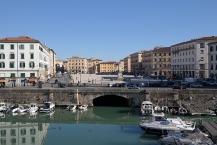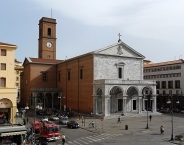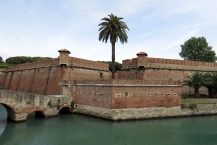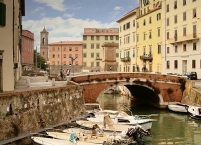Livorno
Sehenswürdigkeiten
Erstellt am 14.10.2022,
zuletzt geändert von biroto-Redaktion am 14.10.2022
Radwege und Fahrrad-Touren in der Nähe
| Name/Bezeichnung | Typ | km zur Strecke |
|---|---|---|
Route | 0,2 km | |
Route | 0,2 km |
![]()
Bitte warten - Kartendaten werden geladen
Art der Sehenswürdigkeit
Historische(s) Gebäude
Name u. Anschrift
Livorno
IT-57123 Livorno
GEO-Daten
GEO-Koordinaten
43.55∎∎∎∎ 10.30∎∎∎∎
Höhe
19 m
Kommunikation
Informationen zu Urheber-Rechten | |
|---|---|
Rechte-Inhaber | |
Rechte-Ausprägung / Lizenz | by-sa: CREATIVE COMMONS Namensnennung, Weitergabe unter gleichen Bedingungen |
Link zur Rechtebeschreibung | |
Bild übernommen aus | https://commons.wikimedia.org/wiki/File:Piazza_della_Repubblica_dalla_Fortezza_Nuova_(Livorno).JPG |
Bild hochgeladen | durch biroto-Redaktion am 14.10.2022
|
Informationen zu Urheber-Rechten | |
|---|---|
Rechte-Inhaber | |
Rechte-Ausprägung / Lizenz | by-sa: CREATIVE COMMONS Namensnennung, Weitergabe unter gleichen Bedingungen |
Link zur Rechtebeschreibung | |
Bild übernommen aus | |
Bild hochgeladen | durch biroto-Redaktion am 14.10.2022
|
Informationen zu Urheber-Rechten | |
|---|---|
Rechte-Inhaber | |
Rechte-Ausprägung / Lizenz | by-sa: CREATIVE COMMONS Namensnennung, Weitergabe unter gleichen Bedingungen |
Link zur Rechtebeschreibung | |
Bild übernommen aus | https://commons.wikimedia.org/wiki/File:Fortezza_Nuova_seen_from_via_degli_Avvalorati,_Livorno.jpg |
Bild hochgeladen | durch biroto-Redaktion am 14.10.2022
|
Informationen zu Urheber-Rechten | |
|---|---|
Rechte-Inhaber | |
Rechte-Ausprägung / Lizenz | by-sa: CREATIVE COMMONS Namensnennung, Weitergabe unter gleichen Bedingungen |
Link zur Rechtebeschreibung | |
Bild übernommen aus | https://commons.wikimedia.org/wiki/File:Livornoveneziavecchia0001.jpg |
Bild hochgeladen | durch biroto-Redaktion am 14.10.2022
|
Livorno is a main port town in Tuscany. It was traditionally called Leghorn in English, nowadays the name is used to refer to a breed of chickens which were exported to North America from the Livorno port.
Understand
Livorno is on the Tyrrhenian sea in Italy. It is the third-largest port on the western coast. Upper Class travellers heading to Rome in the days of the Grand Tour ![]() would often go by sea to "Leghorn" from Marseilles or Genoa. This explains in large part the presence of a substantial English cemetery in the town.
would often go by sea to "Leghorn" from Marseilles or Genoa. This explains in large part the presence of a substantial English cemetery in the town.
See
During the Second World War, Livorno lost a large part of its historic building structure, but the city complex built under the Medici is still clearly visible. The old town is enclosed by the Fosso Reale moat and divided by the arcaded main shopping street Via Grande. The Venezia Nuova district, laid out in 1629, has many old buildings (including former warehouses) and is criss-crossed by canals reminiscent of Venice. Furthermore, buildings from the Belle Epoque have been preserved, especially villas on the Viale Italia waterfront in the southern districts of Ardenza and Antignano.
- ⊙Duomo Duomo San Francesco di Assisi
Dedicated to San Francesco, it was begun at the end of the sixteenth century on a project by Alessandro Pieroni. Later it was enlarged with the addition of two side chapels. Worthy of note is the valuable carved wooden ceiling, which was lost during the last world war, following the almost total destruction of the church. - ⊙Chiesa di San Giovanni Battista
Built in 1624 by Gianfranceso Cantagallina on an earlier building from the 13th century. - ⊙Chiesa di Santa Caterina
Begun in 1720 on a project by Giovanni del Fantasia, it was consecrated in 1755. With an octagonal plan, the church is characterized by a large dome, 63 meters high and reduced to the appearance of a tower due to problems of a static nature. Inside you can admire a remarkable oil painting by Vasari. - ⊙Chiesa della Madonna del Soccorso, Votive church built in the 19th century.
- ⊙Chiesa di San Jacopo in Acquaviva
Of millenary origins, until the sixteenth century the hermitage of San Jacopo was entrusted to the Augustinian Fathers. In the sixteenth century the complex was ceded to the community of the United Greeks and then returned to the Augustinians. Deeply modified in the second half of the eighteenth century, the current appearance dates back to the end of the nineteenth century. - ⊙Fortezza Vecchia
In this fortress all the centuries of the city's history overlap, starting from the first Roman settlements, up to the war devastation of the twentieth century. The current appearance is however due to Antonio da Sangallo the Elder, who, in the early sixteenth century, had the task of transforming a fortification of Pisan origin into an imposing war machine. - ⊙Fortezza Nuova New Fortress. Built by the Medici family to provide additional protection for the city to that provided by an older fortress closer to the sea. Good views of the canals from on top of the fortress but little to see in the fortress itself as much was destroyed in WW2.
- ⊙Palazzo Comunale
- ⊙Torre del Marzocco, octagonal tower near the port, built by the Florentines in 1439 as a sign of their new power.
- ⊙Teatro Goldoni, municipal Theater (1843–1847).
- ⊙Palazzo Gherardesca
- ⊙Monumento dei Quattro Mori
- ⊙Museo Provinciale di Storia Naturale del Mediterraneo, natural history museum with botanical garden.
- ⊙Museo Civico G. Fattori, the museum in Villa Mimbelli (1865) houses an important art collection with works by Macchiaioli.
- ⊙Acquario Comunale Diacinto Cestoni, sea aquarium.
- ⊙Piazza della Repubblica
- ⊙Old English Cemetery (Oldest in Italy, open on reservation). For info call Misericordia ☎ +39 0586 897324 or write an email to Association Livorno delle Nazioni.
- ⊙Venice Quarter. This is a small area of canals between the city and the sea, hence its name. Very pleasant to wander around.
Informationen zu Urheber-Rechten | |
|---|---|
Rechte-Ausprägung / Lizenz | by-sa: CREATIVE COMMONS Namensnennung, Weitergabe unter gleichen Bedingungen |
Link zur Rechtebeschreibung | |
Text(e) übernommen von: |
|
übernommen / bearbeitet am | 14.10.2022
|
übernommen / bearbeitet durch |
|
Radwege und Fahrrad-Touren in der Nähe
| Name/Bezeichnung | Typ | km zur Strecke |
|---|---|---|
Route | 0,2 km | |
Route | 0,2 km |
Erstellt am 14.10.2022,
zuletzt geändert von biroto-Redaktion am 14.10.2022




